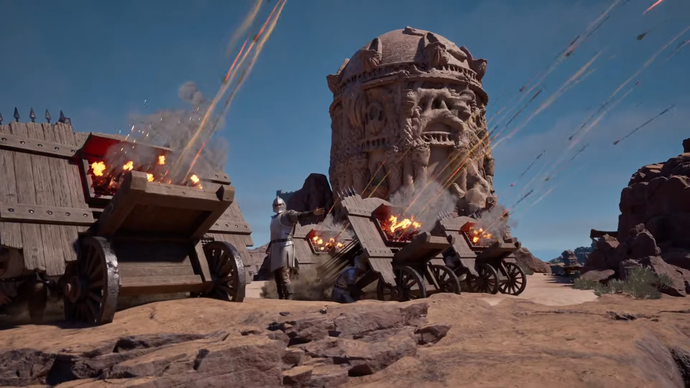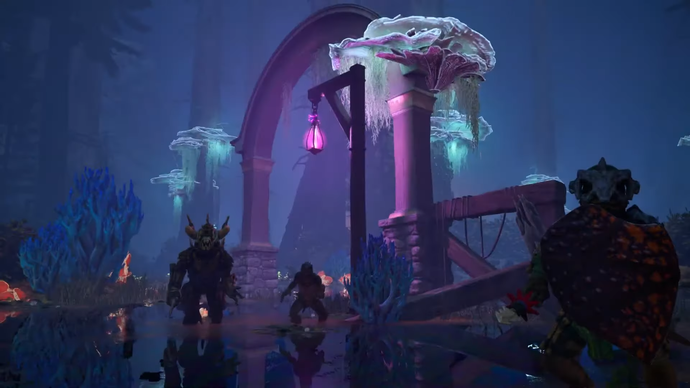When Avowed was first unveiled back at the Xbox summer showcase of 2021, a dark and moody CGI trailer of burning arrows and fantasy spell-and-sword dual wielding – all from the studio behind the likes of Pillars of Eternity and Fallout: New Vegas – positioned it as something of a first-party Skyrim for Xbox.
In the years since however, it’s become increasingly clear that’s simply not the game we should now expect from Avowed. It’s bright and colourful, it’s seemingly dialogue-heavy, and as we learned in further explanations of the game’s combat it is, if anything, only quite loosely an RPG. As Avowed’s director, Carrie Patel, put it to Eurogamer last year after a slightly unconvincing first demo of its combat, “the reference point we’ve been trying to point people to is The Outer Worlds.”
Since then, things have been a little quiet on the Avowed front, but over the weekend Xbox showed another trailer, this time with emphasis on the game’s overarching story – though again it was a little light on anything truly new. Thankfully, we also had a short roundtable interview with Carrie Patel again after the showcase ended, who spoke alongside the game’s art director Matt Hansen and was able to outline just a little more of what we can expect.
On the role-playing front, Patel explained that it would likely be felt most prominently in Avowed’s dialogue. “We have skill trees that take your traditional fighter flavour, ranger, and wizard, and you can mix and match freely between them,” she said. “And you can build a character that either follows one of those vibes very closely or takes the best of what you like from each – and if you decide you don’t like your choices, you can pay a small fee and wipe them and build something entirely different.”
From a “narrative and dialogue perspective,” Patel continued, it’ll be “a huge part of the game, and exploring and really defining your role in it is about the choices you make moment-to-moment. There are skills that also have an impact in dialogue that will unlock certain options for you, the player will get to choose a background at the very beginning of the game that kind of flavours, ‘Here’s who you were before this mission, here’s how you came to prominence.'”
The player “can choose to lean into that, when they’re playing, or they can say, ‘Oh, this is just fun, and I want to use it’. But all of those things give the player different roleplay hooks.”

“The biggest thing for us is always that choice and consequence, in quests, in major critical path moments, letting the player choose how to define the world and how to move the conflicts forward.”
A further gameplay update is due, but beyond the areas that are still slightly unclear – in terms of the finer points in just how exactly Avowed’s moment-to-moment gameplay works – one stand-out observation from its latest trailer in the Xbox showcase was the continued lack of firm release date, with it still left open as merely “2024” for now. Is the studio confident of hitting that window and the game releasing before the end of the year?
“I’ll say, just having come from the studio last week, the game is looking fantastic,” answered Patel. “The team is putting a lot of love into the polish. So we feel very good about 2024.”
Hansen added that the team was currently “finalising”. He continued: “We’re in a polish phase. And that’s such a satisfing place to be for us – and there’s so many little things that we’re like ‘Oh, yeah, we didn’t think we’d be abel to get to that!'” Reassuringly, Patel meanwhile agreed the game was very much in the final stages of development.
One other, somewhat ominous question always lingers in conversations with Xbox’s first-party developers at the moment, which is how they’re feeling in the face of the publisher’s wildly unpopular surprise closures of award-winning studios such as Tango Gameworks and Arkane Austin. Does that sit in the back of your mind as an Xbox-owned developer? Much of the conversation, meanwhile, has centred on the impact of these closures on creativity – can a first-party studio at Microsoft feel safe to experiment and try new things when studios which have done so – and in many cases, done so extremely well – still get closed?
“As a developer – and as a player – it’s always sad and it always sucks to see studios close and devs lose their jobs… I really hope all those people land on their feet, because I know our indusutry is better with them in it,” Patel said.
“As for me and how I look at things, I guess first and foremost: I don’t believe in living in fear. Especially if you need to be invested in the creative process – you have to be invested in what you’re making, and you have to believe in it. And I do feel a strong sense of security in being part of Obsidian and, you know, being a part of a studio that was a successful independent developer for almost 15, 20 years.

“I really trust in our leadership,” she added. “I trust in our process for making games and I trust in our players and our fans who believe in what we do. I’m definitely sad to hear about what’s happened to some of these other studios – it hasn’t diminished my commitment, or my belief in what we’re doing.”
Hansen, meanwhile, added that these situations are never as simple as the developers taking risks, and paying the price when they don’t work out. “These are very complex decisions with so much nuance behind what happens, because they’re challenging decisions that need to be made at times, and so I don’t find that creatively stifling at all. I feel deeply supported, both internally on the dev side and with fans, but also from Microsoft.” The situation was “unfortunate”, he added, “but at the same time, I’m not afraid.”
“As Matt said,” Patel continued, “we’ve been incredible well supported by Microsoft. We’ve also had Feargus Urquhart at the helm of the studio since its inception. And before that, when it was Black Isle Studios. He knows games, he loves games, and he’s been incredibly successful at hauling Obsidian through all of its various iterations. And again, I do want to emphasise that Microsoft leadership and Xbox leadership have also been incredible supportive of what we do, how we make games, and [are] very communicative with us as well.”
“The only side effect that I’ve personally felt since Microsoft aquired us is just more support,” Hansen said. “There’s less unknowns, less financial risk, and so we’re able to take more creative risk – but to do that in a measured way. It’s been a really, really rewarding process.”
